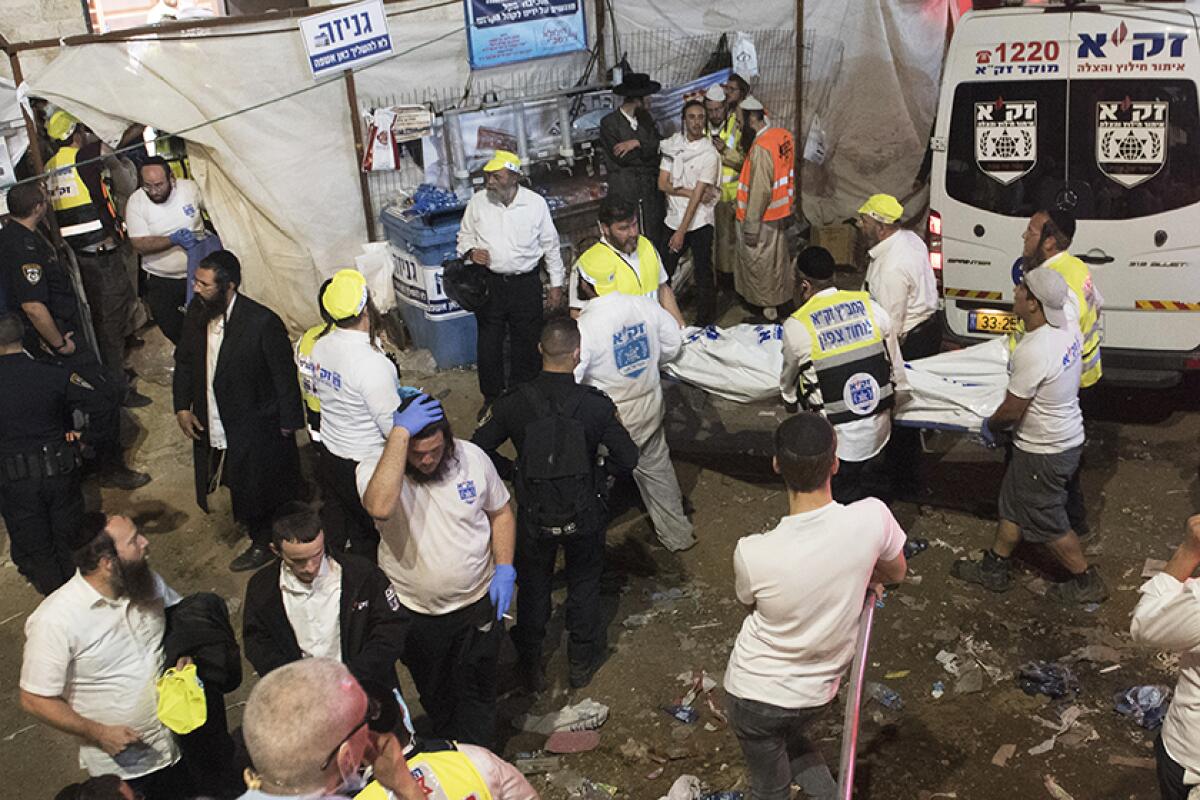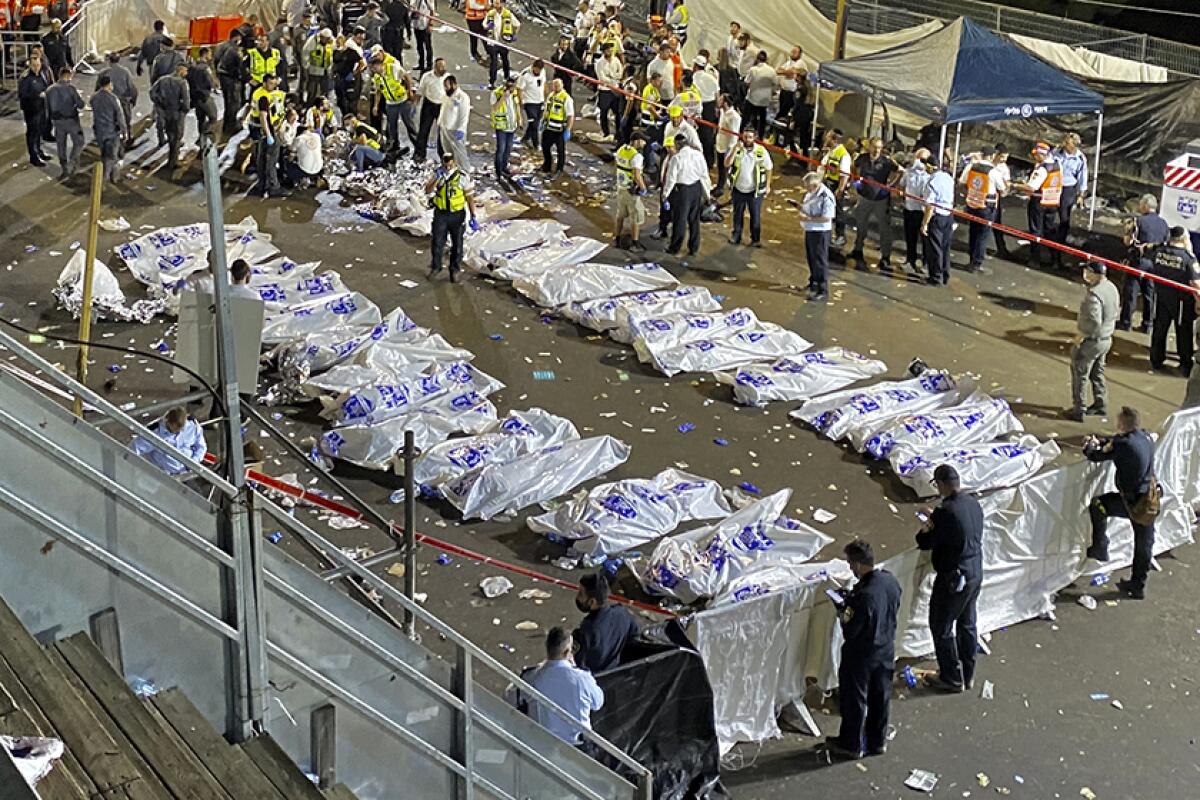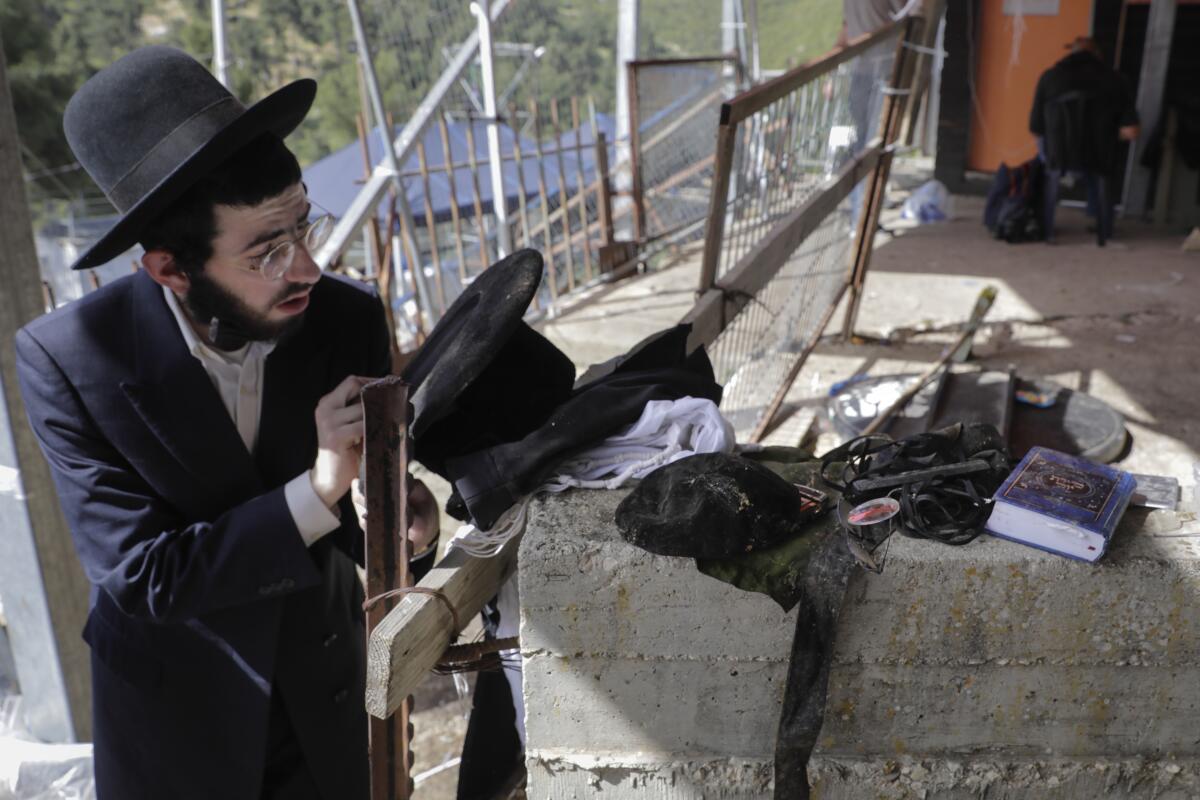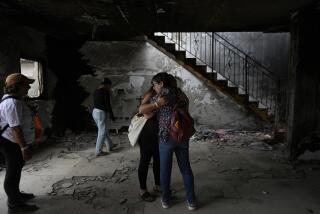‘Like someone was holding me underwater’: Stampede in Israel kills at least 45

JERUSALEM — Israel was plunged into grief on Friday over one of the country’s worst peacetime catastrophes: at least 45 people killed and about 150 injured in a stampede at a religious festival that draws tens of thousands of ultra-Orthodox Jews to a sacred mountain in the country’s north.
Israeli media reported that some American citizens and some children were believed to be among the casualties, but as the day drew to a close and the Jewish Sabbath began, identification of victims was still incomplete.
President Biden expressed sorrow, saying in a statement that the U.S. and Israel are “bound together by our families, our faiths and our histories.” He said the U.S. Embassy and officials in Washington would provide support to any U.S. citizens “affected by this sad event.”
The lethal sequence of events unfolded early Friday as celebrants at what is normally a prayerful and joyous rite of spring became trapped in a tunnel-like, metal-floored walkway, with people falling and crushing one another, according to witness accounts and media reports. As more tried to flee, they were caught up in turn in the suffocating chaos of the throng, mainly black-clad ultra-Orthodox men and boys.
The deadly episode came as the country is emerging from the grip of the COVID-19 pandemic, thanks to a hugely successful vaccination drive, and at a sensitive moment even in Israel’s customarily turbulent politics.
Zvi Cohen was among those trapped in the crowd and described people around him crying and screaming as they struggled to escape.
“I felt like someone was holding me underwater in a pool and wouldn’t let me out,” he told Israel Radio. Later, he found out that a friend who also attended the festival had died.
Amid the wave of mourning that swamped the country of about 9.3 million, pointed questions swiftly emerged, especially over the perils of such an enormous gathering, the role of police in containing the crowd and authorities’ reluctance at times to impose health and safety guidelines on the relatively small but politically influential ultra-Orthodox community.

The tragedy was compounded by the remoteness of the locale — Mt. Meron, in the upper Galilee region, about 100 miles northeast of Tel Aviv — and an apparent partial outage of cell service in the area, which left many of the injured unable to let family members know they were alive.
A young man named Israel, one of 14 siblings, described a harrowing nightlong effort to trace his missing brother, Simha, a 23-year-old father of two toddlers — and his simultaneous efforts to keep their parents away from chat apps on their phones, where terrifying rumors were flying. In the end, he told Israel Radio in a voice breaking with grief, his brother’s death was confirmed at midday Friday.
This year’s gathering for the Lag B’Omer holiday — traditionally marked with bonfires, prayers and dancing to commemorate a 2nd century Jewish uprising against Roman rule — also was especially large because the festival could not be legally celebrated at such a scale this time last year, when the pandemic was raging. Media estimates of this year’s crowd were in the range of 100,000 people, 10 times the number that Health Ministry officials recommended as a limit due to coronavirus precautions.
As details surfaced, including reports that police had blocked exits from the site, recriminations quickly mounted. The state comptroller’s office, which plays a watchdog role, noted that it had warned of a potential disaster on Mt. Meron since 2008, but was ignored. One of the reports explicitly mentioned that the area surrounding the tomb of Rabbi Shimon Bar Yochai, an ancient sage whose death the festival commemorates, was not suitable for mass gatherings.
Police were launching an internal investigation of officers’ actions, the Justice Ministry said. About 5,000 extra security personnel had been sent to help safeguard the event.
As messages of sympathy poured in from around the world — including from some leaders of Israel’s Arab neighbors, such as Jordan’s King Abdullah II — Prime Minister Benjamin Netanyahu declared a day of national mourning Sunday. He called it among “the worst disasters to befall the state of Israel.”
But in some quarters, anger was overtaking grief. During a brief visit to the site, the prime minister was jeered by some ultra-Orthodox youths still awaiting evacuation. A few yelled out: “Netanyahu killed them!”
Outside of conflict, such mass-casualty events are relatively rare in Israel. In 2010, at least 44 people were killed in a wildfire near the northern coastal city of Haifa.
In Jerusalem, 88-year-old Mireille Dassa, the matriarch of a sprawling Orthodox Jewish family, said she felt “growing rage” as she watched the rescue and recovery efforts on television.
“Everybody knew this was going to happen!” she said, describing how the annual event had grown from a fairly small gathering, mainly for Sephardic Jews, into the mass assemblage of recent years.
“I’m waiting to see a single leader from this community take responsibility,” she said. “Where are the rabbis? Where is the leadership?”

In a country that has known decades of conflict, the scene was reminiscent of past calamities such as suicide bombings. Shrouded bodies lay on the ground in the initial hours before they were transported to the country’s main forensic institute, and search-and-rescue personnel swarmed the area.
Dov Maisel, director of operations for United Hatzalah, a Jerusalem-based volunteer emergency medical services organization, likened the atmosphere of trauma to that during a wave of bombings that hit buses and cafes in Israeli towns and cities nearly two decades ago.
“I have no words,” he told Israel Radio. “I honestly have no words.”
Families of those who were in attendance but unaccounted for in the stampede’s aftermath frantically sought information, pleading for help from authorities, who dispatched healthcare workers and others to help coordinate communications.
Israeli yeshivas, or seminaries, have close links with Orthodox communities in New York, New Jersey and elsewhere in North America. While no official identifications were announced Friday, Rep. Mondaire Jones (D-N.Y.) tweeted about the reported deaths of two constituents.
And the Jewish Federation of Northern New Jersey, also on Twitter, said a student from the state, spending a year studying in Israel, was also among the dead. An Orthodox Jewish online publication, Yeshiva World, reported the deaths of a total of five Americans and two Canadians.
Adding to the poignancy, many of the religiously observant bereaved tried desperately to arrange funerals before the start of the Jewish Sabbath at sundown on Friday, when by religious tradition burials do not occur.
A spokesman for the Magen David Adom rescue service, Zaki Heller, said that of the approximately 150 injured, half a dozen were in critical condition, and the death toll could increase. President Reuven Rivlin, whose office is largely ceremonial, lighted 45 memorial candles.
The full political ramifications of the tragedy were not yet known. The makeup of the next government was already unclear after an inconclusive March national election, the country’s fourth in two years.
Netanyahu has tried, so far without success, to form a governing coalition, and is working under a deadline that expires early next week. If he fails, that would open the way for his rivals to try to put together an alliance.
The prime minister must rely on backing from ultra-Orthodox political parties in his bid to retain power, and on Friday some media reports said Netanyahu had told ultra-Orthodox politicians earlier that he was prepared to allow relatively unfettered celebrations of Lag B’Omer this year.
Secular Israelis joined their more religiously observant compatriots in mourning. Rabin Square, the landmark plaza in the heart of Tel Aviv, was full of people volunteering to give blood.
In a city that normally pulses with nightlife, the events publication Time Out Tel Aviv reported a flood of cancellation notices for big parties and similar revelry, and its staff expressed solidarity with victims and their families.
Special correspondent Tarnopolsky reported from Jerusalem and Times staff writer King from Washington.
More to Read
Sign up for Essential California
The most important California stories and recommendations in your inbox every morning.
You may occasionally receive promotional content from the Los Angeles Times.










